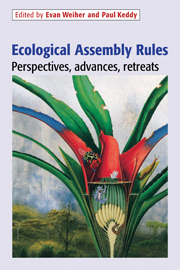Introduction: The scope and goals of research on assembly rules
Published online by Cambridge University Press: 04 September 2009
Summary
Why should assembly rules be studied, why should a symposium be organized, why should a volume on the topic be published, and why should anyone bother to read it? These are all perfectly reasonable questions, and it is our task to briefly address them by way of introducing this volume.
For some time, ‘community ecology’ has been the name loosely applied to a collection of studies and methods that apply to more than one organism, but that apply at scales below the landscape. Many books on community ecology appear to offer little more than a disparate hodgepodge of studies that are unified solely by the above vague restrictions. This may seem a harsh criticism, and a peculiar way to open a book written for community ecologists. But, these sort of criticisms form the ground of this volume (some might suggest charnel ground), and it is not an original observation by any means. Indeed, Pianka (1992), a prominent member of our discipline, has felt obliged to apologize on our behalf in a paper titled ‘The state of the art in community ecology’, observing therein that ‘community ecology has for too long been perceived as repugnant and intractably complex’. He apologizes to a world symposium that ‘the discipline has been neglected and now lags far behind the rest of ecology’.
He is not alone in his survey, opinion and prognosis. Nearly two decades earlier Lewontin (1974) wrote of the ‘agony’ of community ecology.
Information
- Type
- Chapter
- Information
- Ecological Assembly RulesPerspectives, Advances, Retreats, pp. 1 - 20Publisher: Cambridge University PressPrint publication year: 1999
Accessibility standard: Unknown
- 28
- Cited by
